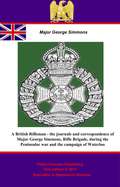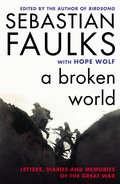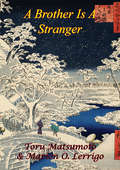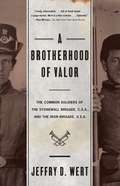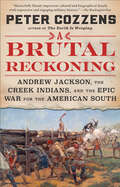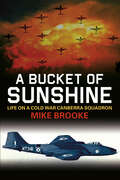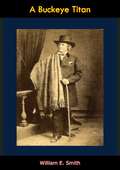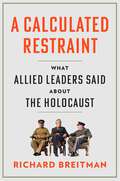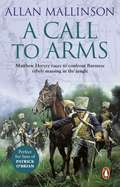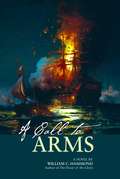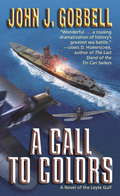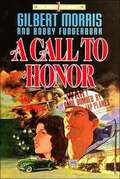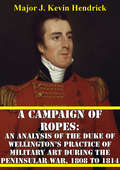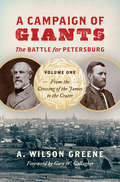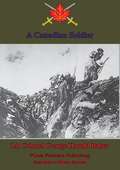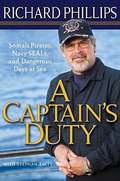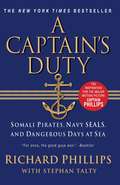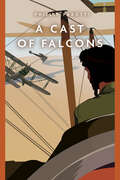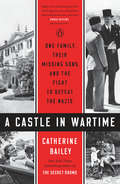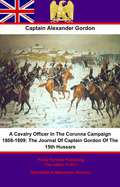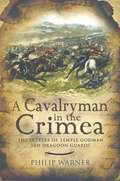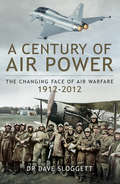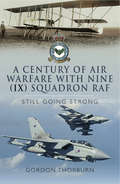- Table View
- List View
A British Rifleman - the Journals and Correspondence of Major George Simmons, Rifle Brigade, during the Peninsular war and the campaign of Waterloo
by Lt.-Colonel Willoughby Cole Verner Major SimmonsThe journals and correspondence of George Simmons add a further lustre to the excellent memoirs and books that men of the 95th Rifles left of the adventures, hard fought actions and grim experiences of the Peninsular War and the Waterloo Campaign. Simmons was commissioned into the 1st Battalion 95th Rifles, a fellow officer of Sir John Kincaid and Sir Harry Smith both of whom left valuable memoirs of the period. A religious and upright man, although not priggish, he kept a journal of the actions movement and events of his life and sent numerous letters home to his family in Hull. These form the narrative which has been ordered by Lt. Col. Verner to flow in sequence through his time fighting Napoleon’s forces.Simmons, and his brothers who often crop up in the volume, was at the forefront of the fighting engaged in by the Light Brigade and later Light Division. He was wounded a number of times, once so seriously at Waterloo as a result of a musket wound to the chest, that his attendants though he might die. He took part in the battles of Fuentes D’Oñoro, Salamanca, Vittoria, the Nivelle, Orthez and finally Waterloo. The storming of Badajoz, Cuidad Rodrigo are also described in vivid detail missing nothing of the fear, death and mayhem of the attacking troops; to give just one excerpt of the action:- I saw my poor friend Major O'Hare lying dead upon the breach. Two or three musket balls had passed through his breast. A gallant fellow, Sergeant Flemming, was also dead by his side, a man who had always been with him. I called to remembrance poor O'Hare's last words just before he marched off to lead the advance. He shook me by the hand saying, "A Lieutenant-Colonel or cold meat in a few hours." I was now gazing upon his body lying stretched and naked amongst thousands more.An excellent read, contemporaneously written and abounding with interesting details.Author – Major George Simmons [1785-1858]Editor – Lt.-Col Willoughby Cole Verner [1852-1922]
A Broken World: Letters, Diaries and Memories of the Great War
by Sebastian Faulks with Hope WolfA lieutenant writes of digging through bodies that have the consistency of Camembert cheese; a mother sends flower seeds to her son at the Front, hoping that one day someone may see them grow; a nurse tends a man back to health knowing he will be court-martialled and shot as soon as he is fit. Edited by the bestselling author of Birdsong and Dr Hope Wolf, this is an original and illuminating non-fiction anthology of writing on the First World War.Diaries, letters and memories, testaments from ordinary people whose lives were transformed, are set alongside extracts from names that have become synonymous with the war, such as Siegfried Sassoon and T.E. Lawrence. A Broken World is an original collection of personal and defining moments that offer an unprecedented insight into the Great War as it was experienced and as it was remembered.
A Brother Is A Stranger
by Marion O. Lerrigo Toru MatsumotoWe in Japan have a saying, "A brother is the beginning of a stranger," because on the father's death the oldest brother acquires such absolute authority as the head of the family that the younger ones and he cannot easily be friends. After our father died, my eldest brother assumed the dictatorial authority of father, as sanctioned by Japanese law and custom. I wanted to live my own life, and I did; but I had to fight for it against the old Japanese tradition that superiors must benevolently govern their inferiors, and inferiors gratefully obey. I have experienced both bitter sorrows and bursting joys. May the young people of a new Japan obtain the happiness of my wife and myself without the struggle we have been through.--A Word From the Author, Toru Matsumoto
A Brotherhood Of Valor: The Common Soldiers Of The Stonewall Brigade C S A And The Iron Brigade U S A
by Jeffry D. WertThis unusual and moving chronicle covers some of the most important battles of the Civil War—Sharpsburg (Antietam), Gettysburg, and Chancellorsville—through the stories of the two brigades who confronted each other on the bloody fields of battle.Drawing on original source material, Jeffry Wert reconstructs the drama and terrors of war through the eyes of the ordinary men who became members of two of the most respected fighting units of their respective armies, the Stonewall Brigade of the Confederacy and the Iron Brigade of the Union. There are tales of grueling marches and almost unbearable deprivations; eyewitness accounts of ferocious fighting and devastating losses on both sides; and portraits of acts of courage and valor performed by soldiers and officers who, despite the difficulties they faced, remained dedicated to the cause for which they were fighting.
A Brutal Reckoning: Andrew Jackson, the Creek Indians, and the Epic War for the American South
by Peter CozzensThe story of the pivotal struggle between the Creek Indians and an insatiable, young United States for control over the Deep South—from the acclaimed historian and prize-winning author of The Earth is WeepingThe Creek War is one of the most tragic episodes in American history, leading to the greatest loss of Native American life on what is now U.S. soil. What began as a vicious internal conflict among the Creek Indians metastasized like a cancer. The ensuing Creek War of 1813-1814 shattered Native American control of the Deep South and led to the infamous Trail of Tears, in which the government forcibly removed the southeastern Indians from their homeland. The war also gave Andrew Jackson his first combat leadership role, and his newfound popularity after defeating the Creeks would set him on the path to the White House.In A Brutal Reckoning, Peter Cozzens vividly captures the young Jackson, describing a brilliant but harsh military commander with unbridled ambition, a taste for cruelty, and a fraught sense of honor and duty. Jackson would not have won the war without the help of Native American allies, yet he denied their role and even insisted on their displacement, together with all the Indians of the American South in the Trail of Tears.A conflict involving not only white Americans and Native Americans, but also the British and the Spanish, the Creek War opened the Deep South to the Cotton Kingdom, setting the stage for the American Civil War yet to come. No other single Indian conflict had such significant impact on the fate of America—and A Brutal Reckoning is the definitive book on this forgotten chapter in our history.
A Bucket of Sunshine: Life on a Cold War Canberra Squadron
by Mike BrookeA Bucket of Sunshine - a term used for the use of a nuclear bomb - is a firsthand insight into life in the mid-1960s on a RAF Canberra nuclear-armed squadron in West Germany on the frontline in the Cold War. Mike Brookes describes not only the technical aspect of the aircraft and its nuclear and conventional roles and weapons, but also majors on the low-level flying that went with the job of being ready to go to war at less than three minutes notice. Brooke tells his story warts and all, with many amusing overtones, in what was an extremely serious business when the world was standing on the brink of nuclear conflict. The English-Electric Canberra was a first-generation jet-powered light bomber manufactured in large numbers in the 1950s. The Canberra could fly at a higher altitude than any other bomber through the 1950s and set a world altitude record of 70,310 feet. Due to its ability to evade early interceptors and providing a significant performance advancement over piston-engine bombers, the Canberra was a popular export product and served with many nations. Although jet powered, the Canberra design philosophy was very much in the Mosquito mould, providing room for a substantial bomb load, fitting two of the most powerful engines available, and wrapping it in the most compant and aerodynamic package possible. Rather than devote space and weight to defensive armament, the Canberra was designed to fly fast and high enough to avoid air-to-air combat entirely.
A Buckeye Titan
by William E. SmithHere is a panorama of life as it was lived and witnessed by one Ohio citizen, his family, and his friends, from 1816-1876. From the diary and correspondence of John H. James of Urbana, Ohio, and from contemporary manuscripts, periodicals, and newspapers, William E. and Ophia D. Smith have created an authentic picture of the times. A Buckeye Titan is not so much a biography of a man as it is an exposition of the contribution of his manuscripts to American history in general and to Ohio history in particular. The point of view presented is that of the protagonist and his friends.Cincinnati and Louisville are seen when slow-moving, square-rigged barges and primate boats propelled by “elastic vigor” crowded their landings, and when stately floating castles received and discharged passengers and cargoes upon their busy rivers. Lexington, Athens of the West, is portrayed as it was in the lush days of Horace Holley. The sophistication of New Orleans, Philadelphia, and New York sets off the awkward adolescence of such Mid-Western towns as Columbus, Dayton, Urbana, and Indianapolis. Against a background of devious politics and frenzied finance, the Mad River and Lake Erie Rail Road begins in Sandusky and stubbornly fights its way to Springfield. Whigs and Loco Focos engage in a titanic struggle of the establishment of a second banking system.Civil War days are graphically drawn. The tumultuous conflict of opinion, the graft and corruption, the political chicanery in the raising of troops and in the promotion of officers and men, the strength and the weakness of the Northern fighting forces and their leaders—all are here.Statesmen and politicians, reformers and scholars, authors and artists, actors and actresses, soldiers, travelers, bankers and merchants, founders of the first Swedenborgian college in the world, and plain everyday people, as well as intimate glimpses of distinguished characters, appear in these pages.
A Burracombe Christmas
by Lilian HarryA short story to whisk you away on a festive trip to the Devonshire village where life is full of surprisesSteal a glimpse at the past lives and loves of your favourite villagers in this captivating Burracombe short story. Autumn 1918 has brought young Alice Whiddon to the Tozer's farm to work as a maid. Alice soon falls in love with the little village and with life on the farm. But that's not all she's falling for. Youngest son, Ted Tozer is half promised to young Ivy Prowse, daughter of a neighbouring farmer, yet Alice and Ted feel a powerful bond forming.But while the first peacetime Christmas in years beckons, romance must wait as influenza comes to the farm and threatens to bring tragedy with it, just as the Tozer's eldest son Joe returns from the front to Burracombe and his sweetheart, Dottie. As Alice and the family wait and hope for the new year to bring long-awaited joy and peace, no one knows whether the bells will peal in sorrow or in celebration as the year turns.
A Calculated Restraint: What Allied Leaders Said about the Holocaust
by Richard BreitmanAn eminent historian of the Holocaust examines why Churchill, Roosevelt, and Stalin, though faced with mounting evidence of the Nazi extermination of Jews, were reluctant to speak out against the atrocities.The Allied leaders rarely spoke directly about the Holocaust in public. When Churchill and Stalin alluded to Nazi mass murder of civilians in early speeches, they said much less than they knew. Not until December 1942 did Allied governments issue a joint statement about Nazi Germany’s policy of exterminating the Jews of Europe. Roosevelt deferred his own public statement until March 1944. Why didn’t these leaders speak up sooner?Through close readings of public and private statements, Richard Breitman pieces together the competing motivations that drove each leader’s response to the atrocities. All three knew that their reactions would be politically sensitive, as Nazi propagandists frequently alleged that the Allies were fighting on behalf of Jews, and that Jews were the puppet masters behind their governments. At a time of globally prevalent antisemitism, these calumnies had force. After the German invasion of the USSR, moreover, Stalin clearly wanted to focus on the threat to the Soviet state and people. At the same time, Churchill and Roosevelt realized that complete silence would prompt accusations of willful blindness. They usually finessed this dilemma by denouncing Nazi atrocities in general, prioritizing wartime constraints over moral considerations.Timely and incisive, A Calculated Restraint sheds new light on the relationship between World War II and the Holocaust. Ultimately, the Allied leaders’ responses cannot be reduced to a matter of character. What they said—and chose not to say—about the Holocaust must be understood in light of the political and military exigencies that drove their decision-making.
A Call To Arms: (The Matthew Hervey Adventures: 4): A rip-roaring and fast-paced military adventure from bestselling author Allan Mallinson (Matthew Hervey #4)
by Allan MallinsonThe Sunday Times bestselling author Allan Mallinson, brings us another action-packed and stirring Matthew Hervey adventure. If you like Patrick O'Brian, Bernard Cornwell and CS Forester, this will not disappoint!"A thoroughly satisfying and entertaining read" - THE TIMES"Matthew Hervey has now joined Bernard Cornwell's Sharpe and Patrick O'Brian's Jack Aubrey" - Birmingham Post"After just half-a-dozen pages I was hooked." -- ***** Reader review"An excellent book, when you start reading you cannot put it down. Allan Mallinson at his best!!!" -- ***** Reader review"Essential reading for military buffs" -- ***** Reader review**********************************************************************India 1819: Matthew Hervey is charged with raising a new troop, and organising transport for India - for he, his men and their horses are to set sail with immediate effect.What Hervey and his soldiers cannot know is that in India they will face a trial for which they are woefully under prepared. A large number of Burmese war-boats are assembled near Chittagong, and the only way to thwart their advance involves a hazardous march through the jungle. Soon Hervey and his troop are in the midst of hot and bloody action once again...A Call To Arms is the fourth book in Allan Mallinson's Matthew Hervey series. His adventures continue in The Sabre's Edge. Have you read his previous adventures A Close Run Thing, The Nizam's Daughters and A Regimental Affair?
A Call to Arms
by William C. HammondCall To Arms is the fourth novel in the award-winning historical / nautical fiction series from William C. Hammond. Along with the other novels in the Cutler Family Chronicles - most recently For Love of Country and The Power and the Glory - it features the epic saga of the seafaring Cutler family of Hingham, Massachusetts and an ever expanding cast of characters. Among these characters are real historical figures including Capt. Edward Preble, Lt. Stephen Decatur, Lt. Richard Somers, Samuel Coleridge, Bashaw Yusuf Qaramanli, and Adm. Horatio Lord Nelson. Interwoven with these historical characters is a fast-paced and gripping plot that takes the reader from Java in the Dutch East Indies to New England at the start of the nineteenth century, and on to Gibraltar, Tripoli, Malta, Sicily, Alexandria and Cairo. Historic events depicted in the novel have been subjected to intense research and have been vetted by historians.
A Call to Colors: A Novel of the Leyte Gulf
by John J. GobbellAmong them is the destroyer USS Matthew and her skipper, Commander Mike Donovan, a veteran haunted by earlier savage battles. What Donovan doesn't know is that Vice Admiral Takao Kurita of Japan has laid an ingenious trap as the Matthew heads for the treacherous waters of Leyte Gulf. But Donovan faces something even deadlier than Kurita's battleships: Explosives secretly slipped on board American ships by saboteurs are set to detonate at any time. Now the Matthew's survival hinges on the ability of Donovan and his men to dismantle a bomb in the midst of the panic and the chaos of history's greatest naval battle.
A Call to Honor (The Price of Liberty #1)
by Gilbert Morris Bobby FunderburkBen Logan was filled with impossible dreams of success and far-off adventure. Always one of the "have-nots" in the small class-conscious town of Liberty, Georgia, he was alternately tolerated and rejected by those that called him "poor white trash" and ridiculed his father, an often-drunk pulpwood cutter. Part of Ben's dream comes true when the daughter of the richest man in town invites him into her self-centered world. Ben is haunted by the memory of her kiss, the soft wetness of her lips against his neck, her fragrance, and her unbearably blue eyes. But when circumstances force Ben to leave Liberty and join the Navy, the memory of that kiss goes with him, erasing thoughts of the other young woman he left behind: Rachel, the thin, freckle-faced daughter of a poor Pentecostal preacher. "God told me I'm going to be your wife," Rachel told Ben on the day he left Liberty. "Are you crazy" Ben scoffed at her. "I'd never marry you in a hundred years!" But everything changed--everything--on December 7,1941, when Ben Logan found himself in Pearl Harbor, leaning into a gun mount on the deck of the USS Arizona...
A Campaign Of Ropes: An Analysis Of The Duke Of Wellington’s Practice Of Military Art During The Peninsular War, 1808 To 1814
by Major J. Kevin HendrickThe purpose of this paper was to study the practice of military art at the operational level of war. The story of Wellington's ultimate success against Napoleon's Marshals was selected as a case study as it seemed rich in the application of mental agility to achieve an asymmetrical military advantage in a theater of war. As military theory recognizes two general types of military art, classical strategy and operational art, the research question was constructed to determine if Wellington practiced pure classic strategy, or an early/transitional form of operational art.In order to provide a basis of analysis, the essential elements of both classic strategy and operational art are next defined. The history of classic strategy is outlined, then the theory of Clausewitz and Jomini used to define its four basic elements. The practice of operational art is then traced, from its inception by U.S. Grant during the American Civil War, to Soviet operational theory developed in the 1920's. The theory of Dr. James Schneider, a primary interpreter of both Grant and the Soviets, provides the eight essential elements of operational art. To round out the section on military art, U.S. operational doctrine is outlined and discussed.Like most military officers, Wellington was a creature of his own experience, therefore a chapter is dedicated to the lessons he learned as a young officer in India. The following chapter is dedicated to a study of the Peninsular War. As the research question deals with both the operational and strategic levels of war, Wellington's tactics are neglected in favor of his campaign concepts and execution.
A Campaign of Giants--The Battle for Petersburg: Volume 1: From the Crossing of the James to the Crater (Civil War America)
by A. Wilson GreeneGrinding, bloody, and ultimately decisive, the Petersburg Campaign was the Civil War's longest and among its most complex. Ulysses S. Grant and Robert E. Lee squared off for more than nine months in their struggle for Petersburg, the key to the Confederate capital at Richmond. Featuring some of the war's most notorious battles, the campaign played out against a backdrop of political drama and crucial fighting elsewhere, with massive costs for soldiers and civilians alike. After failing to bull his way into Petersburg, Grant concentrated on isolating the city from its communications with the rest of the surviving Confederacy, stretching Lee's defenses to the breaking point. When Lee's desperate breakout attempt failed in March 1865, Grant launched his final offensives that forced the Confederates to abandon the city on April 2, 1865. A week later, Lee surrendered at Appomattox Court House.Here A. Wilson Greene opens his sweeping new three-volume history of the Petersburg Campaign, taking readers from Grant's crossing of the James in mid-June 1864 to the fateful Battle of the Crater on July 30. Full of fresh insights drawn from military, political, and social history, A Campaign of Giants is destined to be the definitive account of the campaign. With new perspectives on operational and tactical choices by commanders, the experiences of common soldiers and civilians, and the significant role of the United States Colored Troops in the fighting, this book offers essential reading for all those interested in the history of the Civil War.
A Canadian Soldier
by Lt. Colonel George Harold Baker M.P.Lt.-Col. Baker was born into a family with a long history of service to Canada: his father had served in the Provincial Legislature or the Dominion Parliament for over forty years. Colonel Baker, a man of many interests, undertook law at McGill University and was called to the Bar in 1900. After a successful career, which included a stint as a member of Parliament, his military career started in the cavalry gazetted as a provisional lieutenant in the 6th Hussars, and by 1913 he was Lt.-Colonel of the 13th Scottish Light Dragoons. With the gathering of the clouds over Europe, Colonel Baker steeled himself for field service and responded to a toast to his health: "my aim is to win, if possible, the confidence of my men and to leave the rest to circumstance and the turn of events."His military career was to be of great merit but short in duration, like many of his comrades-in-arms who travelled from the furthest Dominions to Flanders Fields. His story is told in his collection of letters, and a copy of the despatch that memorialises his death; but suffice to say that they are a telling recollection of an upright, honourable soldier, loved by his men, conscientious to his duty, who lay down his life for his country.Author -- Lt. Colonel George Harold Baker M.P. d. 1916Text taken, whole and complete, from the edition privately published.Original Page Count - 83Illustrations -- 3 Portraits
A Captain's Duty: Somali Pirates, Navy SEALs, and Dangerous Days at Sea
by Richard Phillips Stephan TaltyIt was just another day on the job for Richard Phillips, captain of the Maersk Alabama, the United States-flagged cargo ship that was carrying, among other things, food and agricultural materials for the World Food Program. That all changed when armed Somali pirates boarded the ship. The pirates didn't expect the crew to fight back, nor did they expect Captain Phillips to offer himself as hostage in exchange for the safety of his crew. Thus began the tense five-day standoff that ended in a daring high-seas rescue when U.S. Navy SEALs opened fire and picked off three of the captors. "It never ends like this," Captain Phillips said. And he's right. "A Captain's Duty" tells the life-and-death drama of the career sailor who was held captive on a tiny lifeboat off Somalia's anarchic, gun-plagued shores. A story of adventure and courage it provides the intimate details of this high-seas hostage-taking--the unbearable heat, the death threats, the mock executions, and the escape attempt. When the pirates boarded his ship, Captain Phillips put his experience into action, doing everything he could to safeguard his crew. And when he was held captive by the pirates, he marshaled all his resources to ensure his own survival, withstanding intense physical hardship and an escalating battle of wills. This was it: the moment where training meets instinct, where character is everything. Richard Phillips was ready.
A Captain's Duty: Somali Pirates, Navy SEALs, and Dangerous Days at Sea
by Richard Phillips Stephan Talty"I share the country's admiration for the bravery of Captain Phillips and his selfless concern for his crew. His courage is a model for all Americans."--President Barack Obama It was just another day on the job for fifty-three-year-old Richard Phillips, captain of the Maersk Alabama, the United States-flagged cargo ship which was carrying, among other things, food and agricultural materials for the World Food Program. That all changed when armed Somali pirates boarded the ship. The pirates didn't expect the crew to fight back, nor did they expect Captain Phillips to offer himself as hostage in exchange for the safety of his crew. Thus began the tense five-day stand-off, which ended in a daring high-seas rescue when U.S. Navy SEALs opened fire and picked off three of the captors. "It never ends like this," Captain Phillips said. And he's right. A Captain's Duty tells the life-and-death drama of the Vermont native who was held captive on a tiny lifeboat off Somalia's anarchic, gun-plagued shores. A story of adventure and courage, it provides the intimate details of this high-seas hostage-taking--the unbearable heat, the death threats, the mock executions, and the escape attempt. When the pirates boarded his ship, Captain Phillips put his experience into action, doing everything he could to safeguard his crew. And when he was held captive by the pirates, he marshaled all his resources to ensure his own survival, withstanding intense physical hardship and an escalating battle of wills with the pirates. This was it: the moment where training meets instinct and where character is everything. Richard Phillips was ready.
A Cast of Falcons (Casemate Fiction)
by Phillip Parotti"Casemate has a long history of publishing high quality military history non-fiction. Lately, they have expanded their range of work to include well written novels using wartime settings." – WWII History MagazineYoung pilots of the Royal Flying Corps take to the air above the Sinai desert in 1916 to fight German pilots flying far superior aircraft. Will their determination and aggressive spirit be enough to prevail?Phillip Parotti’s new novel offers fast-paced action in the skies over the Sinai desert in 1916. Lieutenant Devlin Collins, an Irish-American flier in the Royal Flying Corps, expecting to fly on the Western Front, instead finds himself flying antiquated two-seater bomber and photo reconnaissance missions over the Egyptian desert against the forces of the Central Powers which are trying to capture the Suez Canal. Pitted against German machines which are up-to-date and well equipped, the men of the RFC fight at a considerable disadvantage as they go forth to meet their enemy, but committed to their cause and with aggressive spirit, no matter how great the stress of battle, they proceed and prevail, continually forcing the Turks and Germans back as the army moves slowly toward Palestine. Constantly endangered by superior German machines, facing incessant ground fire during their bombing and strafing attacks, Dev and his fellow pilot Crisp drive home their attacks with unremitting determination. In the off hours from combat, Dev discovers that he has a particular talent for planning his flight’s air raids. This talent manifests itself completely in the campaign’s culminating attack on the German redoubts at the battle of Magdhaba, an attack so successful that when the pilots are finally pulled back for a rest after a year of fighting, Dev is promoted and invited onto the staff at GHQ is order to apply his expertise to air planning as the army moves on Gaza with the intention of driving into Palestine.
A Castle in Wartime: One Family, Their Missing Sons, and the Fight to Defeat the Nazis
by Catherine Bailey"I was gripped by A Castle in Wartime--it contained more tension, more plot in fact--than any thriller."--Kate Atkinson, author of Big Sky and Case HistoriesAn enthralling story of one family's extraordinary courage and resistance amidst the horrors of war from the New York Times bestselling author of The Secret Rooms.As war swept across Europe in 1940, the idyllic life of Fey von Hassell seemed a world away from the conflict. The daughter of Ulrich von Hassell, Hitler's Ambassador to Italy, her marriage to Italian aristocrat Detalmo Pirzio-Biroli brought with it a castle and an estate in the north of Italy. Beautiful and privileged, Fey and her two young sons lead a tranquil life undisturbed by the trauma and privations of war. But with Fascism approaching its zenith, Fey's peaceful existence is threatened when Ulrich and Detalmo take the brave and difficult decision to resist the Nazis.When German soldiers pour over the Italian border, Fey is suddenly marooned in the Nazi-occupied north and unable to communicate with her husband, who has joined the underground anti-Fascist movement in Rome. Before long, SS soldiers have taken up occupancy in the castle. As Fey struggles to maintain an air of warm welcome to her unwanted guests, the clandestine activities of both her father and husband become increasingly brazen and openly rebellious. Darkness descends when Ulrich's foiled plot to kill the Fuhrer brings the Gestapo to Fey's doorstep. It would be months before Detalmo learns that his wife had been arrested and his two young boys seized by the SS. Suffused with Catherine Bailey's signature atmospheric prose, A Castle in Wartime tells the unforgettable story of the extraordinary bravery and fortitude of one family who collectively and individually sacrificed everything to resist the Nazis from within. Bailey's unprecedented access to stunning first-hand family accounts, along with records from concentration camps and surviving SS files, make this a dazzling and compulsively readable book, opening a view on the cost and consequences of resistance.
A Cat In The Ghetto, Four Novelettes
by Rachmil Bryks"One should read it in order not to forget."--Eleanor RooseveltFirst published in English in 1959 and long unavailable, Rachmil Bryks's vivid stories portray Jewish life in the Lodz ghetto and at Auschwitz. In a spare and tragicomic style, they illuminate the small and large absurdities that arise at the limits of human endurance--from the cooking of "roast meat" made of cabbage leaves to the predicament of Jews forced to cooperate in the hierarchy of their own annihilation. Deceptively simple and often humorous, these stories nevertheless mirror Bryks's nuanced view of major moral dilemmas of the period: action vs. inaction, preserving dignity vs. survival.--Print Ed.
A Cavalry Officer In The Corunna Campaign 1808-1809: The Journal Of Captain Gordon Of The 15th Hussars
by Captain Alexander GordonThis ebook is purpose built and is proof-read and re-type set from the original to provide an outstanding experience of reflowing text for an ebook reader. Captain Gordon led a troop of the 15th Hussars during the first of the British army's campaigns into Spain, commanded by Sir John Moore. Unearthed and published many years after it was written by the esteemed Regimental historian Colonel Wylly, his diary bears testimony to the events of the retreat to Corunna. Gordon writes of his adventures with verve, wit and in some places a little venom when talking of his erstwhile commander Moore; he is fulsome in his description of the Portuguese and Spanish people to whom the British had come to aid. For example when relating the qualities of a local wine he could "only compare the taste of it to a mixture of vinegar and ink" On military matters he is no great respecter of rank, and distributes blame and praise where he believes they should be rightly apportioned. He gives a great first-hand account of the famed skirmish of Sahagun, to which he believes started a moral ascendancy of the British cavalry over their French counterparts. Despite some defective equipment and, as Gordon attributes it, dilatory conduct by the commander, he reaches Corunna unlike a number of his comrades and fellow country-men. A fine read, which despite its format as a journal retains some pace, it gives a great view of the retreat from an expert military eye. Text taken, whole and complete from the 1913 edition, John Murray, London Original -238 pages Author - Captain Alexander Gordon (1781-1872) Editor - Colonel Harold Carmichael Wylly (1858-1932) Illustrations - 1 portrait, 2 plans, 1 map not included because of size [A3] Linked TOC
A Cavalryman in the Crimea: The Letters of Temple Godman, 5th Dragoon Guards
by Philip WarnerAmong the British troops bound for the Black Sea in May 1854 was a young officer in the 5th Dragoon Guards, Richard Temple Godman, who sent home throughout the entire Crimea campaign many detailed letters to his family at Park Hatch in Surrey. Temple Godman went out at the start of the war, took part in the successful Charge of the Heavy Brigade at Balaklava and in other engagements, and did not return to England until June 1856, after peace had been declared. He took three very individual horses and despite all his adventures brought them back unscathed.Godmans dispatches from the fields of war reveal his wide interests and varied experiences; they range from the pleasures of riding in a foreign landscape, smoking Turkish tobacco, and overcoming boredom by donning comic dress and hunting wild dogs, to the pain of seeing friends and horses die from battle, disease, deprivation and lack of medicines.He writes scathingly about the skein of rivalries between the Generals (a good many muffs among the chiefs), inaccurate and highly coloured newspaper reports and, while critical of medical inefficiency, regards women in hospitals as a sort of fanaticism. Yet at other times he will employ the pen of an artist in describing a scene, or wax eloquent on the idiosyncrasies of horses. He is altogether a most gallant and sensitive young cavalryman, and deservedly went on to achieve high rank after the war. Always fresh and easy to read, his letters provide an unrivalled picture of what it was really like to be in the Crimea.
A Century of Air Power: The Changing Face of Warfare, 1912–2012
by Dr. Dave SloggettAn extensive history of the first century of aerial warfare, covering the every major conflict including the two world wars. No other technical development since the introduction of gunpowder has had as great an influence on warfare as the aircraft. From its early beginnings as simply a means of aerial reconnaissance to its utter supremacy on the battlefield, the aircraft has evolved into the most versatile and precise killing machine known to man. In this wide-ranging and comprehensive study, David Sloggett, an internationally-respected defence analyst, investigates the changing role and increasing significance of air power over the course of the previous 100 years. This is accomplished by detailing every major conflict during that period including not only the two world wars and the recent conflicts in the Middle East but also the Korean War, the Cuban Missile Crisis, the Falklands War and Russian use of air power in Afghanistan. Air power&’s role in Malaya, Oman, Kenya and in Northern Ireland is also explained.A Century of Air Power is the most important study of the use of military aircraft ever undertaken and as such provides valuable lessons for the future—not only for the commanders who have to apply these all-powerful weapons but also for the politicians who have to determine its use.
A Century of Air Warfare With Nine (IX) Squadron, RAF: Still Going Strong
by Gordon ThorburnIn the earliest days of World War One, when IX Squadron was formed, we went to the fight in little 50mph machines that were barely capable of taking pilot and observer, a gun and a few small, hand-held bombs into the sky, especially on a windy day. When we took a wireless set, to spot for the artillery and report on troop movements, the extra load forced the defenceless pilot to leave his observer behind.A century later, IX (B) Squadron flies jets that can exceed the speed of sound, place laser-guided missiles within a few centimetres of the target, and transmit the most complex data in real time across the globe.In between, the tale is of ponderous beasts of biplanes, of Wellingtons and Lancasters in the bloody battles of World War Two, of Canberras and Vulcans in the nuclear age of the Cold War.Above all, it's the story of the men and women of the RAF's senior bomber squadron across a hundred years of war and peace, and their words fill this book. We go from those beginnings in wood, wire and fabric kites over France and a pilot armed with a service revolver, to the world's first Tornado squadron in the Gulf wars, over Kosovo and Afghanistan, and so to the present, a century on.It really is one hell of a story.
